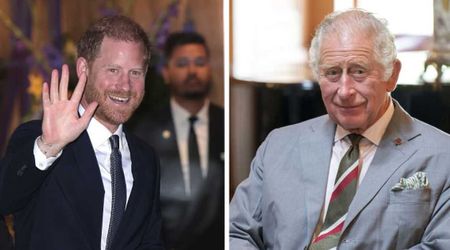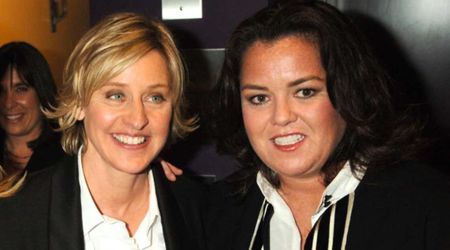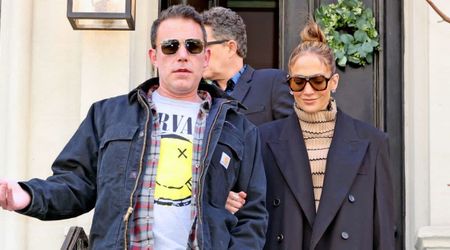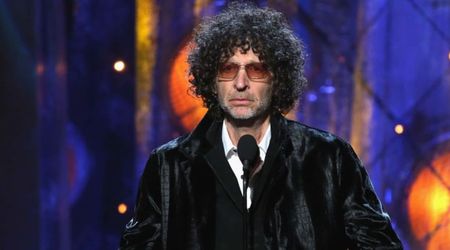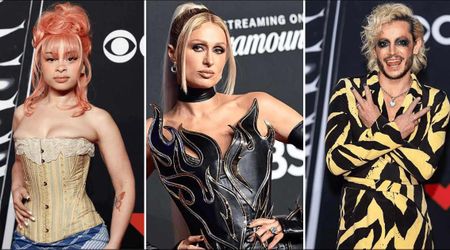Read Donald Sutherland’s letter that helped late actor land iconic role of President Snow in ‘The Hunger Games’

LOS ANGELES, CALIFORNIA: Donald Sutherland, who died on Thursday, June 20 at 88, was best known for his role as President Coriolanus Snow in 'The Hunger Games' franchise, but not everyone might know he got this role.
'The Hunger Games' is Lionsgate's successful franchise which is based on Suzanne Collins' bestselling book series. Here, the character Katniss Everdeen played by Jennifer Lawrence is pitted against Sutherland's villainous President Snow.
How did Donald Sutherland get his role in 'The Hunger Games'?
In 2014, ahead of the release of 'The Hunger Games: Mockingjay Part 1' the Sutherland told GQ he was never actually offered the role of the film's callous, collected president.
Rather, he was cast after reading the books and when he penned a passionate three-page letter about the role to Gary Ross, the original film's director.

He said, "Nobody asked me to do it. I wasn't offered it. I like to read scripts, and it captured my passion. I wrote them a letter. The role of the president had maybe a line in the script. Maybe two. Didn't make any difference."
"I thought it was an incredibly important film, and I wanted to be a part of it. I thought it could wake up an electorate that had been dormant since the '70s. I hadn't read the books."
"To be truthful, I was unaware of them. But they showed my letter to the director, Gary Ross, and he thought it'd be a good idea if I did it. He wrote those wonderfully poetic scenes in the rose garden, and they formed the mind and wit of Coriolanus Snow."
Read Donald Sutherland's letter to Gary Ross
The letter, written as an email, was made available for fans on the 2012 DVD release of 'The Hunger Games' in a segment titled 'Letters from the Rose Garden'.
"Dear Gary Ross:
Power. That's what this is about? Yes? Power and the forces that are manipulated by the powerful men and bureaucracies trying to maintain control and possession of that power?
Power perpetrates war and oppression to maintain itself until it finally topples over with the bureaucratic weight of itself and sinks into the pages of history (except in Texas), leaving lessons that need to be learned unlearned. Power corrupts, and, in many cases, absolute power makes you really horny. Clinton, Chirac, Mao, Mitterrand.
Not so, I think, with Coriolanus Snow. His obsession, his passion, is his rose garden. There's a rose named Sterling Silver that's lilac in colour with the most extraordinarily powerful fragrance — incredibly beautiful — I loved it in the seventies when it first appeared. They've made a lot of offshoots of it since then.
I didn't want to write to you until I'd read the trilogy and now I have so: roses are of great importance. And Coriolanus's eyes. And his smile. Those three elements are vibrant and vital in Snow. Everything else is, by and large, perfectly still and ruthlessly contained. What delight she [Katniss] gives him. He knows her so perfectly. Nothing, absolutely nothing, surprises him. He sees and understands everything. He was, quite probably, a brilliant man who's succumbed to the siren song of power.
How will you dramatize the interior narrative running in Katniss's head that describes and consistently updates her relationship with the President who is ubiquitous in her mind? With omniscient calm he knows her perfectly. She knows he does and she knows that he will go to any necessary end to maintain his power because she knows that he believes that she's a real threat to his fragile hold on his control of that power. She's more dangerous than Joan of Arc.
Her interior dialogue/monologue defines Snow. It's that old theatrical turnip: you can't 'play' a king, you need everybody else on stage saying to each other, and therefore to the audience, stuff like "There goes the King, isn't he a piece of work, how evil, how lovely, how benevolent, how cruel, how brilliant he is!"
The idea of him, the definition of him, the audience's perception of him, is primarily instilled by the observations of others and once that idea is set, the audience's view of the character is pretty much unyielding. And in Snow's case, that definition, of course, comes from Katniss.
Evil looks like our understanding of the history of the men we're looking at. It's not what we see: it's what we've been led to believe. Simple as that. Look at the face of Ted Bundy before you knew what he did and after you knew.
Snow doesn't look evil to the people in Panem's Capitol. Bundy didn't look evil to those girls. My wife and I were driving through Colorado when he escaped from jail there. The car radio's warning was constant. 'Don't pick up any young men. The escapee looks like the nicest young man imaginable'.
Snow's evil shows up in the form of the complacently confident threat that's ever-present in his eyes.
His resolute stillness. Have you seen a film I did years ago? 'The Eye of the Needle'. That fellow had some of what I'm looking for.
The woman who lived up the street from us in Brentwood came over to ask my wife a question when my wife was dropping the kids off at school. This woman and her husband had seen that movie the night before and what she wanted to know was how my wife could live with anyone who could play such an evil man. It made for an amusing dinner or two but part of my wife's still wondering.
I'd love to speak with you whenever you have a chance so I can be on the same page with you. They all end up the same way. Welcome to Florida, have a nice day!"

Three sequences of Snow in his rose gardens during the games were inspired by Ross's answer to the letter.
"That's the relationship you want from an actor and director, where it's a give and take," Ross said on the DVD.
"It's collaborative. It's one person offering something to the other who then takes it, extrapolates it, runs with it, gives it back to the actor who gives the scene back to me … that's the way filmmaking works best."



